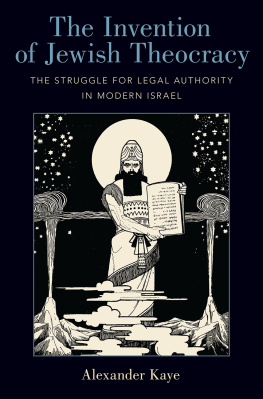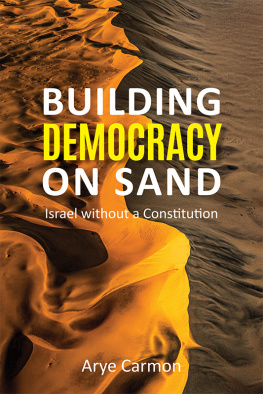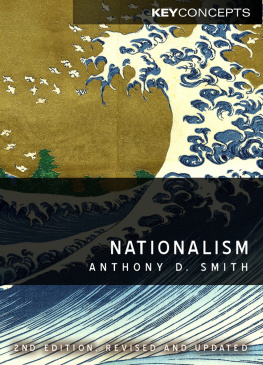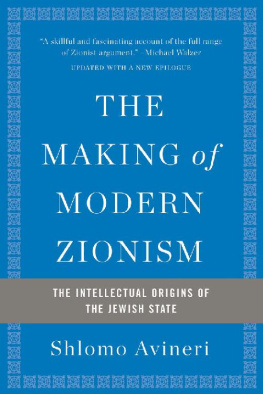JUDAISM,
NATIONALISM,
and the
LAND of ISRAEL
Judaism, Nationalism, and the Land of Israel
Martin Sicker
First published 1992 by Westview Press, Inc.
Published 2018 by Routledge
52 Vanderbilt Avenue, New York, NY 10017
2 Park Square, Milton Park, Abingdon, Oxon OX14 4RN
Routledge is an imprint of the Taylor & Francis Group, an informa business
Copyright 1992 Taylor & Francis
All rights reserved. No part of this book may be reprinted or reproduced or utilised in any form or by any electronic, mechanical, or other means, now known or hereafter invented, including photocopying and recording, or in any information storage or retrieval system, without permission in writing from the publishers.
Notice:
Product or corporate names may be trademarks or registered trademarks, and are used only for identification and explanation without intent to infringe.
Library of Congress Cataloging-in-Publication Data
Sicker, Martin.
Judaism, nationalism, and the land of Israel / Martin Sicker.
p. cm.
Includes bibliographical references and index.
ISBN 0-8133-8247-5
1. Jewish nationalismHistory. 2. ZionismHistory. 3. Jew
Identity. 4. Palestine in Judaism. 5. Judaism and state.
6. IsraelPolitics and government. I. Title.
DS143.S4754 1992
956.94dc20 92-11591
CIP
ISBN 13: 978-0-367-01571-8 (hbk)
To my late brother-in-law Arnon Fixman, who would have enjoyed discussing the thesis of this book with me. May his memory serve as a blessing.
An intimate historic as well as intellectual relationship exists between Judaism, Jewish nationalism, and the Land of Israel. This relationship is unique in a number of respects. From biblical days to the present, the Land of Israel has been closely linked to the Jewish religion and to a nationalist understanding of that interconnection. This work will explore these linkages in order to clarify the essential nature of the ideological debate now taking place in Israel and the worldwide Jewish community over the future of the Jewish state and its relation to the Jewish Diaspora.
I should begin by explaining why I refer to "Jewish nationalism" rather than the more familiar termZionism, There is good reason for distinguishing between the two concepts. The signal role of the Zionist movement in bringing to realization the idea of a Jewish state only a few decades ago has tended to obscure the proper place of Zionist ideology in the vastly longer intellectual history of Jewish nationalism. Whereas Zionism typically has come to be equated with Jewish nationalism, it would be far more accurate to consider it as a critical aspect or manifestation of that conceptual formulation in modern times. This common misconception about Jewish nationalism has made it particularly difficult for many observers to comprehend the ideological struggle going on in Israel. A case in point is the lack of readiness, or sheer unwillingness, on the part of many to recognize that the era of Zionism, as it has generally been understood for more than a hundred years, is rapidly coming to an end (if it has not already done so). Zionism is yielding its place to other nationalist constructions that, in many essentials, are quite different from, if not alien to, conventional Zionist thinking.
The central purpose of this book is to examine briefly the intellectual history of an extraordinarily powerful conceptthe idea of Jewish nationalismthat has effectively conditioned the history of the Jews for more than three millennia. Within this long time span, the historical niche occupied by Zionism, notwithstanding its crucial importance for contemporary Jewry, represents but a brief interlude. To some extent, Zionism might even be legitimately considered as an aberration from the long-standing forms and concepts of traditional Jewish nationalism. Accordingly, this book is not concerned with the history of the Zionist movement, nor does it address the nuances introduced by a wide variety of Zionist thinkers in the ongoing ideological battles between its several schools and tendencies.
Zionism is principally an intellectual product of the second half of the nineteenth century; the idea of Jewish nationalism, however, is probably the oldest nationalist conception known to history. Although there certainly were peoples and nations that preceded the Jews, it seems it was only among the latter that the fundamental concepts that have shaped the history of nationalism were first articulated. Thus, when discussing the origins of modern nationalism, Hans Kohn observed, "Three essential traits of nationalism originated with the ancient Jews: the idea of the chosen people, the consciousness of national history, and national Messianism," The role of these notions in Jewish thought and literature will be the focus of this book.
To set the stage, . Particular attention is given to the manifestation of this conflict in the various schools of Jewish philosophy and mysticism.
, I turn to a consideration of the political Zionism conceived by Theodor Herzl, followed by an examination of the basic modifications made to this formulation of Jewish nationalism by the insertion of socialist concepts into the Zionist agenda.
Finally, I conclude with a brief discussion of the principal intellectual trends touching upon the threefold relationship that were and remain current in the twentieth century. In I focus on the decline of Zionism as a vibrant nationalist ideology and the renaissance of a vigorous traditional synthesis of Judaism, nationalism, and the Land of Israel, That renaissance is posing an increasingly significant challenge to the secularist interpretation of Israel's past and prospect.
The book draws no conclusions regarding the eventual outcome of the present ideological conflict over the nature and future direction of Jewish nationalism. If it succeeds in clarifying this intellectual struggle, it will have fully satisfied my intent and purpose.
1
The Founding of the Nation
As is the case with all ancient groups, there is no extant historical evidence of the origins of the Jews as a people and very little concerning their early formative years as a nation. All that we do have of significance in this regard are the stories and references preserved in the earliest literature of the Jews, the Hebrew Bible, most of which, of course, dates from a period when the Jews were already long constituted as the people of Israel. Accordingly, the most appropriate point of departure for this study is Israel's self-conception of its beginning, as it is manifested in the biblical literature, in what may be referred to as its national foundation myth.
I hasten to add that I do not use the term "myth" in the ordinary sense of a fable or imaginary story, something that is a product of pure fantasy. Many mythsparticularly political foundation mythsdeal with real historical events and people. With respect to such myths, Henry Tudor wrote:
We may disagree with the account they give of these people and events, but they are not fiction. For the most part, the myth-maker does not invent his facts; he interprets facts that are already given in the culture to which he belongs. What marks his account as being a myth is, not its content, but its dramatic form and the fact that it serves as a practical argument. Its success as a practical argument depends on its being accepted as true, and it is generally accepted as true if it explains the experience of those to whom it is addressed.







